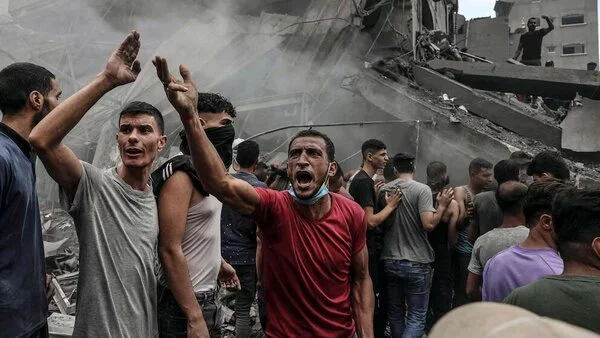Dozens killed in Israel’s Air Attack on Gaza Refugee Camp

On the 25th day of the conflict, Israeli airstrikes targeted the Jabalia refugee camp in northern Gaza. These airstrikes, aimed at a Hamas commander, Ibrahim Biari, resulted in the destruction of apartment blocks and tragic loss of life. The attack claimed the lives of more than 50 people and left about 150 individuals injured, according to Hamas officials. The images and video footage from the scene depict a scene of devastation, with rescue teams working diligently to search for survivors.
In an interview with CNN, Lt Col Richard Hecht, an Israeli military spokesperson, addressed the issue of civilian casualties. He acknowledged the tragic nature of warfare.
Urgent Calls for Ceasefire
The UN Secretary-General, António Guterres, reiterated his call for an immediate ceasefire and emphasized the importance of all parties respecting international humanitarian law. He stated, ‘I condemn the killing of civilians in Gaza and am dismayed by reports that two-thirds of the victims are women and children.'”
According to figures provided by the Hamas health ministry, the relentless bombardments have resulted in the tragic loss of over 8,525 Palestinian lives, including a heart-wrenching toll of 3,542 innocent children. “The numbers are appalling,” said a Unicef spokesperson, James Elder. “Gaza has become a graveyard for thousands of children. It’s a living hell for everyone else.” Without a ceasefire and greater humanitarian access into the Gaza Strip “we hurtle towards even greater horrors afflicting innocent children”, said Elder.

Resignation and Damaged Aid Infrastructure
In a significant development, Craig Mokhiber, the director of the UN’s New York office of the high commissioner for human rights, resigned in protest of what he described as a “textbook case of genocide.” The International Federation of Red Cross and Red Crescent Societies reported severe damage to their Gaza City warehouses, severely affecting aid distribution.
The World Health Organization (WHO) revealed that they had been unable to provide aid to northern Gaza hospitals due to security concerns, and warned of an impending public health catastrophe. Destruction of water and sanitation infrastructure would spread disease, said Christian Lindmeier, a WHO spokesperson. “It’s an imminent public health catastrophe.” Rick Brennan, the WHO’s regional emergencies director, said “atrocious” conditions could lead to outbreaks of diarrhoea and respiratory and skin infections such as scabies
Continued Clashes
The conflict shows no signs of abating, with reports of fresh clashes, particularly around Gaza City. Israeli tanks and infantry have targeted tunnel entrances and rocket launch positions. “Random killings and detention is as regular occurrence in the west bank, which has no presence of Hamas, proving that it is the Palestinian population as a whole, and not just Hamas- an organization- which is the real target of the State of Israel” said Mahfuz Anam, Editor and publisher of The Daily Star.
Conclusion
The situation in Gaza remains deeply concerning, with a dire need for a ceasefire and humanitarian aid access. The toll on civilians, especially children, is alarming, and the damaged aid infrastructure further exacerbates the crisis. Urgently, international attention and diplomatic efforts must address the pressing humanitarian needs and put an end to the suffering in Gaza.


- Art
- Causes
- Best Offers
- Crafts
- Dance
- Drinks
- Film
- Fitness
- Food
- Games
- Festival
- Gardening
- Health
- Home
- Literature
- Music
- Networking
- Other
- Party
- Religion
- Shopping
- Sports
- Theater
- Wellness



